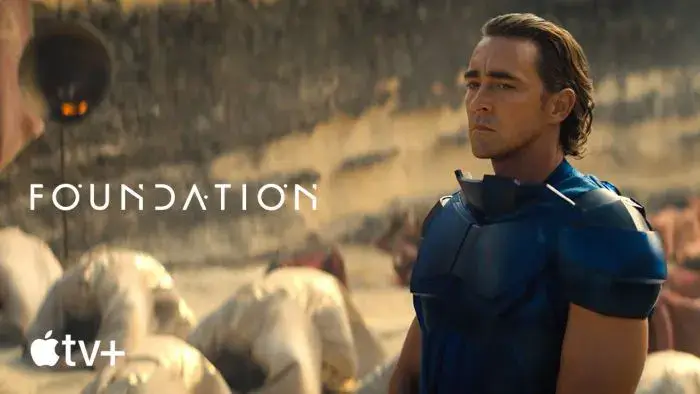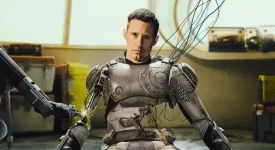(may contain spoilers)
Douban rating: 6.5/7.4
Director: Roxann Dawson, Alex Graves, Jennifer Phang, David S. Goyer
Starring: Lou Llobell, Lee Pace, Jared Harris, Leah Harvey, Laura Birn
Douban Comments: “I’m not a fan of the original novel; just watched the show for what it is, and I highly recommend it based on that alone. If you’re thinking about watching it, don’t let online comments influence you too much. A novel is a novel, and a movie is a movie; they’re naturally different. Movies need to visualize and present things through sound and images, while some things in novels just can’t be shown on screen. It’s like how a movie can’t directly show that a lemon is sour; it needs other ways to express that. Some fans of the original book may act like they’re superior. Watching a movie is a personal experience. Just enjoy it for yourself. Everyone feels things differently.”
“Psychohistory is basically a form of determinism, the idea that God doesn’t play dice, and everything is measurable, knowable, and predictable. If your computing power is strong enough and your math is good enough, you could be Hari Seldon. The sci-fi visuals like black hole jumps, space elevators, and imperial city-worlds are definitely impressive. But people’s everyday lives in the show feel completely ordinary. There’s no real sense of advanced technology or a futuristic world, which creates a disconnect. I hope future episodes go beyond the usual clichés of war, power, desire, and profit, and really bring out the deeper sci-fi essence of Foundation. The 4-star rating is just to be encouraging.”

“A very interesting adaptation. Asimov’s original work didn’t seem to include many specific scenes, but this series fills in those blanks in my imagination. It even manages to have pacing, highs and lows, the kind of completeness you expect from a modern production. I think the show’s core message is that the history of a group can be predicted, but an individual’s fate is always a mystery. Whether it’s the android saying, ‘Every emperor’s last day is different,’ or the way love constantly drives individual actions, it all reflects that idea.”
“6/10. The budget was clearly spent on things you can see with the naked eye: weathered statues towering over the deserts of Foundation’s planet, stone gates radiating massive magnetic fields, boats drifting around Gaal’s ocean hometown, the emperor’s temple and murals overly grand. The all-powerful emperor can wipe out an entire rebel’s family with a mere hand gesture, yet walks half-naked in the desert, blistered by a poisonous sun, and is humbled like a mortal by the hallucinatory salt pool in the sacred cave, stepping devoutly into the temple of the Maiden’s planet.
But all these indistinct spectacles and a dull script have turned the adaptation into a shallow, flashy space opera. The novel’s thought-provoking ideas about authoritarian leadership, clone ethics, historical grudges between races, and resource conflicts struggle to resonate with today’s audiences.
The only interesting theme is whether human free will can influence the course of history. The seemingly unshakable cloned emperors are actually mediocre heirs of a strongman. They don’t create history; they merely serve to preserve the status quo. When Seldon, the embodiment of historical determinism, accurately predicts the frontier rebellion, and the youngest emperor, full of new blood, dies in the struggle between the two older emperors, it ends up rejecting the possibility of progress altogether.”
“Honestly, managing to weave the original Foundation trilogy into one coherent adaptation, and doing it like this, is no small feat. The first half felt a bit scattered, and Seldon showing up deus ex machina-style was a bit too frequent.
On the other hand, the Emperor storyline added a lot of original material, and while you can see the influence of other works, it was actually pulled off quite well. Overall, it was still an engaging watch. Demerzel and Brother Dawn really brought a lot of charm to the show.
The story starts picking up from around episode 7 or 8, and it gets more exciting from there. I hope they keep going and give it a proper conclusion.
Even though the show’s scope doesn’t quite match the grand structure of the original novels, where different forces evolve and balance under a huge sci-fi framework, this adaptation leans more toward a typical Western drama with twists and thrills, probably to appeal to a broader audience. Hopefully they can strike a better balance in future seasons.”
“As someone who hasn’t read the original books, I respect the negative reviews from fans of the original. But after watching the whole show, I don’t think there’s anything fundamentally wrong with it. The core story and side plots are pretty clear, and the characters are well-developed. The royal storyline, the Terminus storyline, and the Second Foundation storyline are all independent and logically consistent. I don’t understand why so many people are criticizing it.”
“8.5/10. Compared to Season 1, Season 2 feels like a completely different show, and yet it’s the same writers and directors. What happened?
The plot is much tighter, with no unnecessary dragging or filler, and the storytelling is clever and well-paced. The last few episodes really hit their stride, each one better than the last, even moving at times.
Episode 8, with Demerzel’s backstory, was a classic emotional dilemma: follow her feelings or follow her programming. No matter what she chooses, someone gets hurt. The suspense skyrocketed, and the truth was both heartbreaking and chilling.
Episode 9’s mother-daughter farewell had me in tears, and Day’s ending was so satisfying. The General’s fate was poetic.
After watching Season 1, I was disappointed and almost didn’t bother with Season 2. I’m glad I gave it a chance. I’ve forgotten most of the original novels anyway, so I just treated it like a brand-new show. And it turned out to be a real surprise.”








